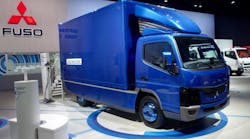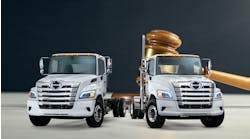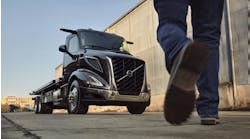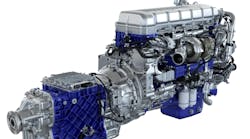Mitsubishi Fuso begins eCanter electric truck production
The eCanter all-electric medium-duty truck designed by Mitsubishi Fuso Truck and Bus Corporation (MFTBC) is now starting what’s being terms “short-series” production at the OEM’s factory in Tramagal, Portugal, for the U.S. market.
MFTBC, a division of Daimler Trucks Asia, added that the Fuso eCanter is produced alongside its conventional Canter “light” medium-duty unit at the Tramagal plant. Only the electric-powertrain-specific components will be installed in specific boxes along the production line, the OEM pointed out.
The all-electric eCanter units coming from Tramagal will be handed over to customers within Europe and the U.S. within the next month. Later this year, that same plant will produce components for the new Fuso FE Series Gas trucks, which will be assembled in the U.S., MFTBC said.
“From now on, we can address the growing demand for locally emission-free delivery trucks in mega-cities,” noted Marc Llistosella, president and CEO of MFTBC and head of Daimler Trucks Asia, in a statement.
“We already received the first customer orders and will mark the global launch of this truck in New York, one of the world’s most iconic ‘mega-cities’ this September,” he emphasized. “Our Portuguese plant not only produces the trucks for Europe and the U.S., but has also benefitted from a close cooperation with the authorities in Portugal and Lisbon, having tested the trucks there since 2014.”
The OEM noted its eCanter has a range of 60 to 100 miles and a load capacity of two to three tons, depending on body and usage. The vehicle’s electric powertrain contains six high-voltage lithium ion battery packs, rated 420 volts and 13.8 kilowatt/hours each.
The battery packs are being delivered from Daimler subsidiary Accumotive in Kamenz, Germany.
MFTBC added that the eCanter underwent “extensive” customer trials conducted in Portugal and Germany between 2014 and 2017. In comparison with a conventional diesel truck, the OEM said it offers savings up to $1,890 per 10,000 miles on operating costs along with “significant” reduction of carbon dioxide (CO2) emissions.



